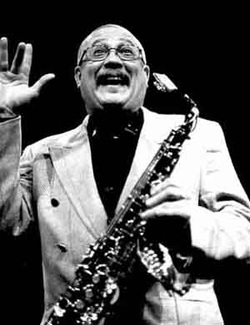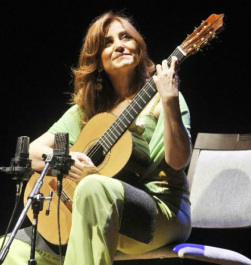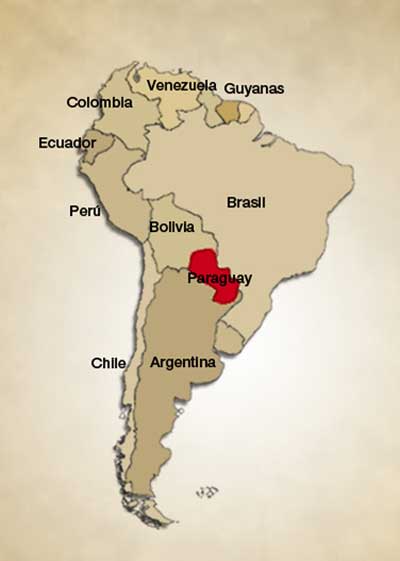
In the dedication found in the liner notes, Berta simply states “To Paraguay, my country and my people.” This is the simple summation of the intent and inspiration of this magnificent recording. The CD features great composers and styles representing the music of Berta’s homeland; a land too long ignored for its rich contributions to astonishing music and musicianship.
Paquito D’Rivera is from Cuba and began his career as a child prodigy. To have a musician of D’Rivera’s performing and composing skills alongside Rojas’ dedication to her homeland makes for a moving and enlightening journey into Paraguay. Hers is the old love of home and his is the new love of a captivated traveler.
There are twelve songs on the CD and half of them are from the pen of Augustin Pio Barrios Mangoré.
Barrios is one of the pioneers in guitar recording as well as one of the greatest guitar composers of all time. His work was overshadowed by Andres Segovia and Heitor Villa- Lobos but even the great Villa-Lobos called Barrios “the Untouchable.”
Popular classical guitarist John Williams spoke in this way of Barrios: "As a guitarist-composer, Barrios is the best of the lot, regardless of era. His music is better formed, it's more poetic, it's more everything! And it's more of all those things in a timeless way."
The first piece by Barrios and the opening track on the album is Las Abejas (The Bees). As I read the sheet music for the piece, I was profoundly grateful that I had chosen to play piano. The virtuosity level is extreme. Segovia heard Barrios perform in 1922 and also remarked at the virtuosic elements in the music that he witnessed, saying the music was “ideal for the repertory of any concert guitarist.”
And the lovely Berta Rojas nails it. The piece begins with just Berta on guitar and the listener is enthralled from the very beginning. Then she is joined by the tenor sax of her virtuoso equal, Paquito D’Rivera. The result is more like Brubeck’s Rondo a la Turk than Rimsky-Korsakov’s Flight of the Bumblebee…and I mean that in a good way. But it is not all tempo and precision; there is great lyricism and melody at work here and it is a beautiful introduction to this album.
The YouTube link below will reveal this brilliantly.
Much of North America’s ignorance of all things Paraguayan is probably due to the cultural and political isolation suffered by that nation due to 35 years of repressive dictatorship under the control of General Alfredo Stroessner who assumed control in 1954 following two decades of war, civil war and dictatorships.
On February 3, 1989, Stroessner was finally overthrown in a military coup d’etat. The June 1992 constitution embraced a democratic system of government and vastly improved the protection of fundamental human rights. In May 1993, fair and free elections chose the first civilian president in almost 40 years. Since then, Paraguay has achieved remarkable economic, political and legal legitimacy. In 2010, the nation enjoyed its greatest economic boom in over 30 years, and was ranked number three in the world in its increase in the GDP.
In a word, Paraguay has much to celebrate and the world should be celebrating with them, especially in the new-found exposure to the amazing music of this amazing country. This new CD from Rojas and D’Rivera is the soundtrack of rediscovery and celebration.

Recuerdos de Ypacaraí (Memories of Ypacarí) was written by Demetrio OrtÍz, born in 1916 in Paraguay. The song is reminiscent without being maudlin. The story goes that OrtÍz had visited Lake Ypacarí and saw a woman whose beauty left him breathless. After the passing of time, he was alone and the memory came to him as fresh as ever. This piece was born of that memory. It is not a memory of what might have been or of a lost opportunity but it is a souvenir of something that had touched him once and still.
Oddly enough, the song’s opening measure, or two, might recall to the hearer the song by William Best (I Love You) For Sentimental Reasons. Of course, the two songs are entirely unrelated but the comparable introductory measures are amusing.
Pájaro Choguí – Galopera opens with the most soothing guitar and is joined by the alto sax of such beautiful compliment. Berta’s playing is charming and captivating but, as the two of them glide into the second movement, Berta also begins to reveal the power of her playing. The strength and control she exhibits ranks her alongside any guitarist one would care to name. Consideration of her gender should never enter a discussion about her musicianship. Her delicacy is always ready to be displayed, but her precision and power are also always in evidence.
Berta Rojas’ name belongs in the very same breath as Segovia or Williams or Parkening or Bream. The truth is, Segovia was often heavy-handed and Rojas has never displayed that. Bream was influenced by Django Reinhardt and it shows in his energy. Williams is admired for his light touch and Parkening for his intricacy. Berta has all of those characteristics at her command; showing Bream’s jazziness and Williams’ gentleness and Parkening’s flawlessness, without being irrevocably enslaved by comparisons to them or any others.
Rojas is Rojas and that is the highest complement one could bestow upon another.
Preludio in Do Menor (Prelude in C Minor) is a Bach-inspired piece by Agustin Barrios, again. The arranger, Mauricio Cardoza Ocampo, is said to have arranged the play between guitar and clarinet as representing the encounter of Barrios and Astor Piazzolla. This piece is thrilling and, in many ways, the most satisfying of all the selections. It is like hearing words of love spoken between a mathematician and a poet—the intricate and complex meeting the unrestrained and emotional.
The track arrangement is perfect on this album. The seamless flow between songs is detailed and inevitable. Che Trompo Arasa (My Wooden Top) follows next and it opens sweetly and moves to excitement and energy. Rightly so, as the song portrays a child playing with a wooden top complete with the spinning following the dropping of the top. The simple excitement of the child is clearly felt, even more than heard, in this bright piece. Paquito’s attack is exuberant and wide-eyed. Berta’s steady handedness forms the successful basis for the resulting euphoria.
These two musicians should partner together again and again and again; like Reinhardt and Grapelli, Jarrett and Garbarek.
Another composition by Demetrio OrtÍz is the middle track and fits perfectly. Mis Noches Sin Ti (My Nights Without You) brought world-wide fame to the composer in 1946. The subject matter is not what may be expected. The sweetness is not romantic but almost child-like. The absence is not the agonizing missing of a lover, but is the departure of an anchor. OrtÍz composed the piece shortly after the death of his mother and that knowledge makes the composition even more heartbreaking. There is joy recalled but, in the end, there is absence.

Choli is a haunting melody that D’Rivera treats with affectionate respect as Rojas steadily pulls at the heart. José AsuncÍon Flores writes of the missing love that once burned so hotly within him for the woman who has left him and Rojas and D’Rivera have played it with a disowned coolness that carries the emotion certainly intended by the composer. It is a masterstroke.
Mario Miguel Clavel was born in Argentina who incorporated the native rhythm of the guarania form of Paraguay into his music. The astonishing clarinet playing alongside the elegant classical guitar truly gives voice to the emotions of desire and longing. These musicians possess a true mastery of interpretation and adaptation.
This is in full display for the three remaining pieces of the album—all composed by Barrios. Caazapá is followed by Choro da Saudade (Nostalgic Choro) and the album concludes with Danza Paraguaya (Paraguayan Dance). While Barrios was considered a late-Romantic, so much of his music was informed by his love of South American and Central American folk music—especially, of course, the music of Paraguay.
Caazapá was a traditional folk melody that Barrios used as the structure for this piece. It recalls his home and his love for it, while Choro da Saudade (Nostalgic Choro) was written upon Barrios’ realization that he would never again see his homeland. The longing for home permeates every note.
Berta and Paquito do not leave the listener downcast, however. Danza Paraguaya (Paraguayan Dance) is the unfettered joy of being home (or of reveling in someone else’s love of their home). This is the shared emotion of Berta and Paquito. She sings through the guitar of a love of home and he raises his horn in celebration of her love. It is the joy of seeing something beloved through the eyes of one who loves it best.
Indeed Paquito felt that a day and a half was for too short a time to truly appreciate the beauty of Paraguay, but listeners will feel that Día y Medio (A Day and a Half) has given us exactly what we need to truly appreciate the beauty and the mastery of six composers and two magnificent performers.

 RSS Feed
RSS Feed
